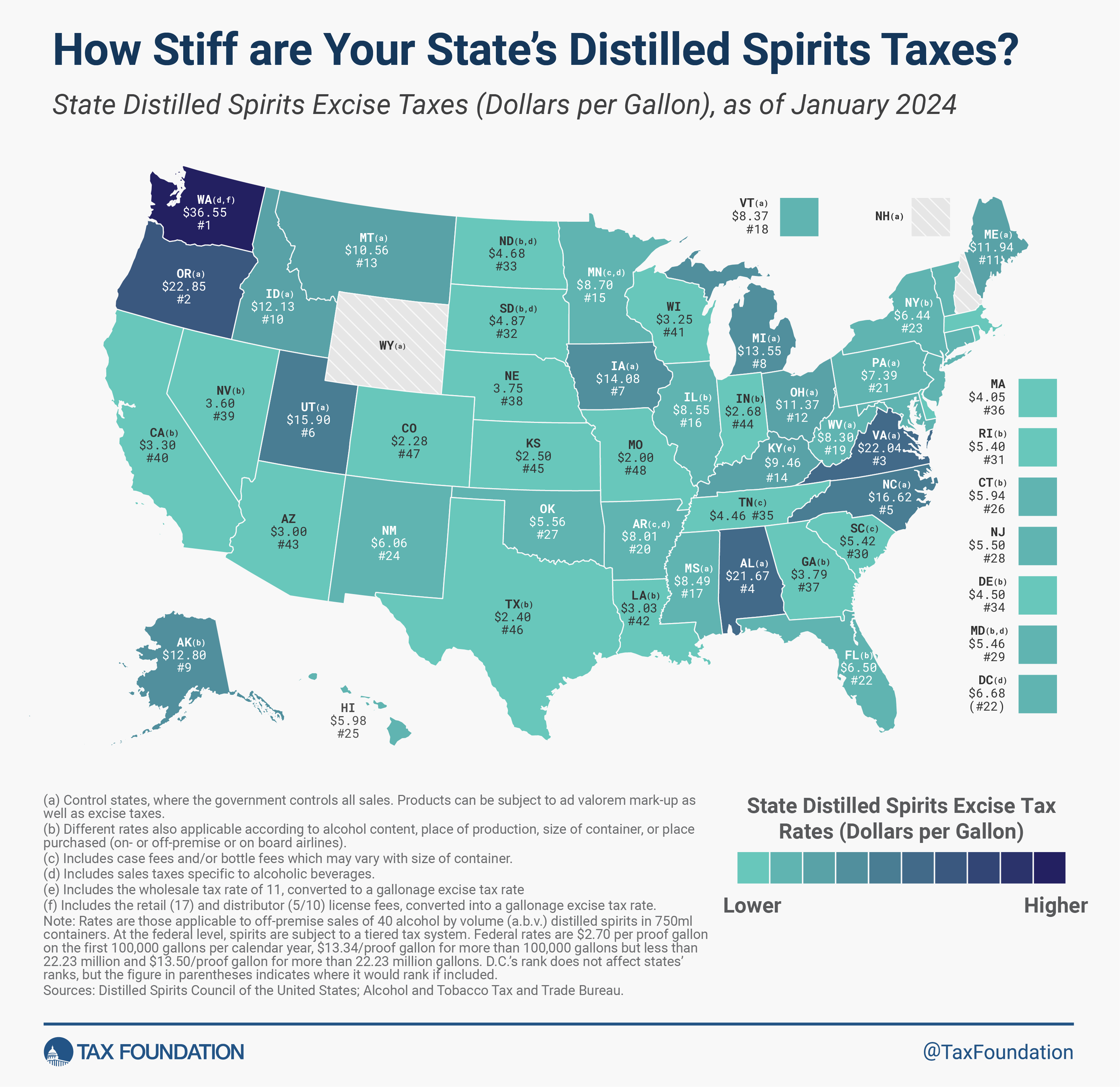Distilled spirits lead American alcohol sales. In 2023, spirits sales (42 percent of market share) outpaced beer sales (41.9 percent of market share) for the second straight year. Newer products like spirits-based hard seltzers and ready-to-drink cocktails have fueled growth, while also blurring the lines of a categorical tax system. The result has been a spirited competition throughout the alcohol industry for market share, including calls to reform taxA tax is a mandatory payment or charge collected by local, state, and national governments from individuals or businesses to cover the costs of general government services, goods, and activities.
policy.
Distilled spirits face the stiffest tax rates of all alcoholic beverages. These high tax rates are a combination of greater alcohol content in spirits than wine or beer and higher tax rates applied per alcohol content to spirits. A one-ounce shot of 40 percent alcohol-content spirit (0.4 oz of alcohol) carries greater taxes than an identical 12-ounce beer with 4.8 percent alcohol content (0.4 oz of alcohol).
Across states, a variety of policies are applied to the sale of distilled spirits. Data for this map come from the Distilled Spirits Council of the United States (DISCUS). To allow for comparability across states, DISCUS uses a methodology of estimating tax rates that combines the various ways in which spirits are taxed and sold.
In 17 states, the government operates a monopoly of state-controlled liquor stores. In these control states, the government can leverage its market power to artificially inflate prices in lieu of levying a formal tax. The data in the map represent the implied excise taxAn excise tax is a tax imposed on a specific good or activity. Excise taxes are commonly levied on cigarettes, alcoholic beverages, soda, gasoline, insurance premiums, amusement activities, and betting, and typically make up a relatively small and volatile portion of state and local and, to a lesser extent, federal tax collections.
rates in those states with government monopoly sales.
These data also include additional fees and sales taxes applied to spirits in addition to legislated excise taxes. The other taxes and fees include case and bottle fees, special sales taxes on spirits, wholesale taxes, and retail and distributor license fees. Distilled spirits tax rates may also differ within states according to alcohol content, place of production, or place purchased (such as on- or off-premises or onboard airlines).
Across states, Washington state levies the greatest excise tax rate on distilled spirits, at $36.55 per gallon. Rounding out the five stiffest rates are Oregon ($22.85), Virginia ($22.04), Alabama ($21.67), and North Carolina (16.62).
Distilled spirits are taxed the least in Wyoming and New Hampshire. These two control states gain revenue directly from alcohol sales through government-run stores and have set prices low enough that they are comparable to buying spirits without taxes. Missouri taxes are the next lightest at $2.00 a gallon, followed by Colorado ($2.28), and Texas ($2.40).
The disparity in tax rates across states underscores the complex tax and regulatory environment surrounding distilled spirits. As the product landscape continues to evolve, and calls for policy reform intensify, principled public policy changes should support both industry growth and responsible consumption with neutral, simple, and transparent taxes.
Stay informed on the tax policies impacting you.
Subscribe to get insights from our trusted experts delivered straight to your inbox.
Share
Previous Versions
-
Distilled Spirits Taxes by State, 2023
4 min read
-
Distilled Spirits Taxes by State, 2021
3 min read
-
Distilled Spirits Taxes by State, 2020
2 min read
-
Distilled Spirits Taxes by State, 2019
3 min read
-
Distilled Spirits Taxes by State, 2018
2 min read
-
Distilled Spirits Taxes by State, 2017
2 min read
-
Distilled Spirits Taxes by State, 2016
2 min read
-
Distilled Spirits Taxes by State, 2015
2 min read
-
Distilled Spirits Taxes by State, 2014
2 min read
